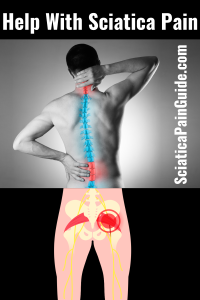Help with Sciatica Pain
Discover effective tips to help with sciatica pain. From at-home remedies to expert advice, find relief and reclaim your comfort today! Sciatica pain can be an unwelcome companion in our daily lives, affecting our ability to move, work, and enjoy simple pleasures. As someone who has navigated the challenges of sciatica, I understand the frustration and discomfort it brings. In this guide, I’ll share valuable insights and suggestions on managing sciatica pain, drawing from personal experiences and the wisdom of healthcare professionals.
Introduction to Help with Sciatica Pain: A Personal Guide to Relief
Sciatica is not just a medical term. It’s a daily struggle for many. It occurs when the sciatic nerve, which runs from the lower back down the legs, becomes irritated or compressed. The pain can range from mild discomfort to sharp, shooting sensations, impacting mobility and overall well-being. As someone passionate about providing support, let’s explore ways to alleviate sciatica pain.
Understanding Sciatica Pain
Causes and Symptoms
Sciatica pain can stem from various sources, such as herniated discs, spinal stenosis, or even muscle spasms. Recognizing the symptoms, including radiating pain, numbness, and tingling, is crucial for early intervention.
How it Affects Different Age Groups
While sciatica is commonly associated with aging, it can affect individuals of all ages. Understanding the unique challenges faced by different age groups allows for more tailored approaches to relief.
Seeking Professional Advice
Importance of Consulting a Healthcare Professional
Before embarking on any self-treatment, seeking guidance from a healthcare professional is paramount. They can conduct thorough examinations, recommend diagnostic tests, and provide personalized advice.
Diagnostic Procedures and Tests
MRI scans, X-rays, and nerve conduction studies are common diagnostic tools that help pinpoint the root cause of sciatica. These tests guide healthcare professionals in developing an effective treatment plan.
At-Home Remedies for Sciatica Relief
Hot and Cold Therapy
Alternating between hot and cold packs can help reduce inflammation and soothe sciatic nerve pain. Simple yet effective, this at-home remedy provides immediate relief.
Gentle Exercises and Stretches
Engaging in specific exercises and stretches can strengthen the muscles surrounding the sciatic nerve, promoting flexibility and reducing pain. It’s crucial to perform these under professional guidance to avoid exacerbating the condition.
Ergonomic Adjustments
Importance of a Supportive Chair and Posture
Making adjustments to your workspace and investing in a supportive chair can significantly alleviate sciatica pain. Maintaining good posture is equally essential to prevent further strain on the lower back.
Tips for Sitting and Standing Comfortably
Simple changes, such as using a lumbar roll or taking short breaks to stretch, can make sitting for extended periods more manageable. Similarly, standing desks can offer relief for those who experience discomfort while sitting.
The Role of Nutrition
Foods that May Alleviate Sciatica Pain
Incorporating anti-inflammatory foods, such as fatty fish, fruits, and vegetables, into your diet can contribute to reducing sciatic nerve inflammation and promoting overall nerve health.
Hydration and Its Impact on Nerve Health
Staying hydrated is often overlooked but plays a crucial role in maintaining optimal nerve function. Dehydration can exacerbate sciatica symptoms, making it essential to prioritize adequate fluid intake.
Alternative Therapies
Massage Therapy and Its Benefits
Regular massages can help release tension in the muscles surrounding the sciatic nerve, providing relief from pain and promoting better overall well-being.
Acupuncture as a Complementary Approach
Acupuncture, an ancient Chinese healing technique, involves the insertion of thin needles into specific points on the body. Many individuals find relief from sciatica through this holistic approach.
Medication and Pain Management
Over-the-Counter Options
For mild to moderate pain, over-the-counter medications like ibuprofen or acetaminophen may provide relief. It’s crucial to follow recommended dosage guidelines and consult with a healthcare professional.
Prescription Medications for Sciatica Relief
In some cases, prescription medications such as muscle relaxants or anti-seizure drugs may be prescribed to manage sciatica pain. Understanding the potential side effects and benefits is essential.
Preventing Sciatica Recurrence
Lifestyle Changes for Long-Term Management
Adopting a healthy lifestyle, including regular exercise, a balanced diet, and stress management, is key to preventing recurrent episodes of sciatica.
Regular Exercise and Its Preventive Role
Engaging in activities that strengthen the core and improve flexibility can significantly reduce the risk of sciatica recurrence. Tailored exercise plans should be developed in consultation with healthcare professionals.
Supportive Devices
Use of Lumbar Cushions and Back Braces
Supportive devices like lumbar cushions and back braces can provide additional support, especially during prolonged periods of sitting or standing.
Ergonomic Mattresses for Better Sleep
Investing in a mattress that supports proper spinal alignment is crucial for individuals with sciatica. Quality sleep contributes to overall healing and well-being.
Mind-Body Connection
The Impact of Stress on Sciatica
Stress can exacerbate sciatica symptoms, making it essential to incorporate stress-reducing practices such as meditation, deep breathing, or yoga into daily routines.
Mindfulness and Relaxation Techniques
Cultivating mindfulness through techniques like meditation can help individuals better manage pain and enhance their overall quality of life.
Experiences and Success Stories
Real-Life Accounts of Managing Sciatica
Sharing personal experiences and success stories can provide inspiration and motivation for individuals currently dealing with sciatica. It fosters a sense of community and understanding.
Inspiring Stories of Recovery
Highlighting stories of individuals who have successfully overcome sciatica can instill hope and optimism in those currently facing challenges.
When to Consider Surgery
Exploring Surgical Options
Surgery is typically considered when conservative treatments fail to provide relief. Understanding the different surgical options and their potential outcomes is crucial.
Understanding the Risks and Benefits
Like any medical intervention, surgery comes with risks. It’s essential for individuals to weigh the potential benefits against the risks and make informed decisions in consultation with healthcare professionals.
Community Support and Resources
Online Forums and Support Groups
Engaging with online communities and support groups allows individuals to share experiences, seek advice, and gain insights into managing sciatica.
Sharing Experiences and Gaining Insights
Creating a sense of community is vital for individuals dealing with sciatica. Sharing experiences fosters empathy and provides valuable information that can aid in the journey to relief.
FAQs About Sciatica Pain
Can sciatica pain go away on its own?
Sciatica pain often improves with time and conservative treatments. However, seeking professional advice is crucial for proper management.
Are there specific exercises to avoid with sciatica?
While exercise is generally beneficial, individuals with sciatica should avoid high-impact activities or exercises that exacerbate pain. Consulting a healthcare professional is advisable.
How long does it take to recover from sciatica?
Recovery time varies based on the individual and the severity of the condition. Consistent adherence to treatment plans and lifestyle adjustments can expedite recovery.
Is surgery the only option for severe sciatica pain?
Surgery is considered when conservative treatments fail. Many individuals find relief through non-surgical methods, so surgery is not always the only option.
Can stress worsen sciatica symptoms?
Yes, stress can contribute to the exacerbation of sciatica symptoms. Managing stress through relaxation techniques is beneficial in overall pain management.
Help with Sciatica Pain – Conclusion
In conclusion, to help with sciatica pain, managing sciatica pain requires a comprehensive approach that addresses both physical and emotional aspects. By combining professional guidance, at-home remedies, lifestyle adjustments, and community support, individuals can find relief and improve their overall quality of life.
Disclaimer
Please note that the information provided in this article is for informational purposes only and should not replace professional medical advice. If you’re experiencing sciatica pain or any health concerns, it’s advisable to consult a healthcare professional for proper diagnosis and treatment.






